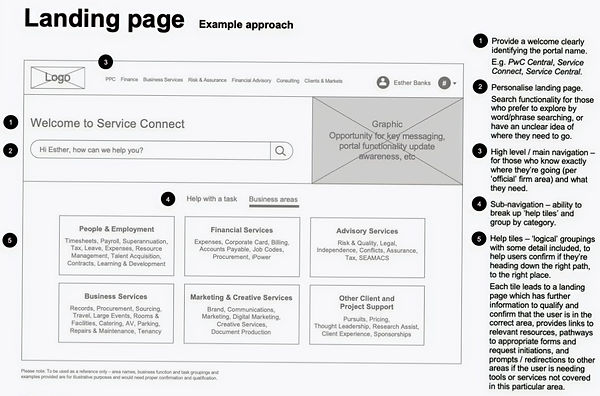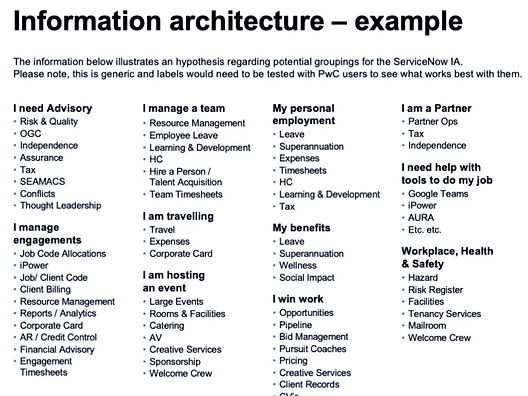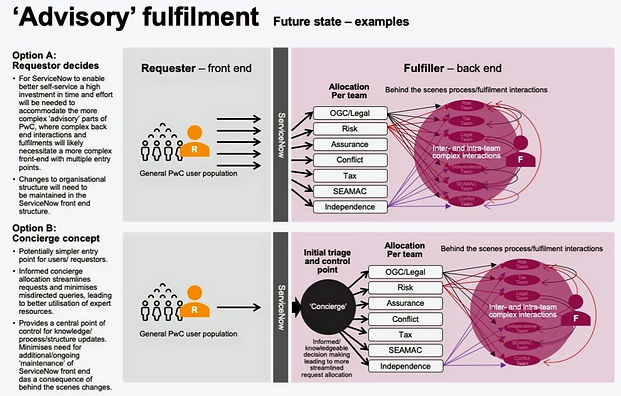Design Researcher @ DXC Consulting
for PwC
THE ENVIRONMENT
GETTING ACQUAINTED
THE PROJECT
Non-IT internal back office services provide critical support to the customer facing parts of PwC's business. These services could included anything from providing legal, risk assessment and compliance advice, to facilities booking, document management and HR related services. In this document, those divisions providing non-IT back office services are called Fulfillers or service providers, whilst those seeking the service via an enquiry are called Requestors or service consumers.
PwC had selected ServiceNow as the platform for a new firm-wide, self serve Enquiry Management system to replace the multitude of enquiry systems that have evolved over time to meet the needs of this function.
THE PROBLEM

know which system to use to make an enquiry and there is very little consistency
Currently there exists a multitude of disparate enquiry systems which are used by the various service providers (Fulfillers). Consequently service consumers (Requestors) need to
of interface or process between these systems. Additionally there are multiple knowledge repositories, also held on a multiplicity of disparate systems,
making self service for simple or standard enquiries challenging. Many of
not enable audit trail of an enquiry or its journey to resolution. Instead users rely on scattered email threads which do not allow meaningful
search functionality.
The new ServiceNow Enquiry Management system is intended to provide a
consistent interface and process for requesting non-IT back-office services and
Our research will aim to answer the question "how might the Service Now platform be designed to best meet the needs of requestors accessing non-IT back office services, and those of fulfillers performing a series of activities often in collaboration with others within and without their team, to respond to the requestor's enquiry?"
help towards building a knowledge base of past enquiries and responses that can be
accessed easily by both requestors and fulfillers in the performance of their day to day
activities.
these enquiry and knowledge base systems are Lotus Notes based, which do
MY ROLE
Part of a team of 3, we collaborated on all aspects of the project from interviews to preparation of reports. Our role consisted of:
-
Conducting research in line with research goals.
-
Daily updates and collaboration with larger project team consisting of DXC's Service Now team and PwC's project leadership team.
-
Sense make and provide research insights for the purpose of:
-
optimising the usability of Service Now design;
-
meeting employees' expectations and needs of the new ServiceNow technology and roll out; and
-
assist in the development of an interactive prototype by a partner digital agency, through sharing of research insights.
THE DISCOVERY
GATHERING THE EVIDENCE
RESEARCH
-
Contextual research - User interviews
-
Interviews were conducted onsite at client premises.
-
Participants were interviewed Individually or in pairs.
-
Interviews were conducted in person or via video link.
-
Participants were interviewed by 2 of our team - an interviewer and a scribe.
-
We adopted a conversational style in our interviews.
-
Each interview was 1 hour.
SAMPLING
We interviewed 25 participants including:
-
Service providers (Fulfillers) and service consumers (Requestors)
-
Australia wide participants
-
Participants from all levels within the organisation - Partners to Juniors
-
Participants with varied years of service - 6 months to several years.
SYNTHESIS & INSIGHTS
MAKING SENSE OF IT ALL

Critical success factors:
business, change & technology
Service request and fulfilment experience insights
Insight themes

Some text has been deliberately blurred to protect client confidentiality
CODING, THEMING, EXPLORING
Once we had finalised our notes, we worked together as a team, to make sense of the data. This included:
-
Coding our notes and participant quotes.
-
Clustering (affinity mapping) these codes into common themes.
-
As themes began to emerge we began to identify key insights.
-
At this point we noticed that these insights fell into two categories
- those that needed to be addressed in the design of ServiceNow; and
- those that needed to be addressed by the environment external to ServiceNow.
e.g. ServiceNow design would need to address confidentiality requirements of certain enquiries, whilst the business would need to address change management issues surrounding the roll out of new technology including ServiceNow.
-
It was imperative to understand the complexity of inter and intra departmental relationships and how these teams interacted within and with each other in fulfilling an enquiry request. We prepared interaction maps to decipher and distill these relationships.
-
We also identified and explored more fully, the requirements of unique/complex situational contexts and scenarios, that would need special consideration during the design of Service Now.
THE OUTPUT
REPORTING OUR FINDINGS
INSIGHTS REPORTING


Some text has been deliberately blurred to protect client confidentiality
A draft Insights report was delivered as an interim document showcasing the key themes discovered and evidenced by employee quotes.
We continued to drill down on the insights uncovered, to more fully explore and understand their implications on the design of Service Now and prototype.
Journey maps were prepared to explore the end to end journey of Requestors and Fulfillers. The requestor's journey was pre-dominantly a standard journey of making an enquiry, some follow-up interaction with fulfiller, waiting for and then receiving a response. However the fulfillers journey varied in complexity depending on the business division. In addition to standard fulfiller journeys, we selected and mapped out the more complex enquiry fulfilment journeys to understand the complexities of intra and inter divisional interactions and the range of knowledge base access required, to enable a fulfiller to perform their job easily and efficiently.
Any one employee could be a service consumer for one transaction whilst being a service provider or queue manager for another. User stories were created to espouse the needs of each role within a team - Requestor, Fulfiller, and enquiry queue manager.
JOURNEY MAPS & USER STORIES

Story: Actions and Experience
Pain Points
Opportunities
Steps
Triage
Answer Query

High Level User Stories
As requestor, I want:
As a fulfiller, I want:
As a manager / queue manager, I want:
Some text has been deliberately blurred to protect client confidentiality
OTHER VISUAL TOOLS
We also created a variety of other visual documentation such as user flow diagrams and eco systems maps, to visualise, explore and document unique scenarios that would require special consideration. User Flow diagrams/Eco System maps supported by User Stories and Journey maps to visualise and explore more complex and unique scenarios.
RESEARCH OUTPUTS REPORT
COLLABORATING ON MODELLING
We worked closely with the Service Now Design team to explore different Information Architecture options - particularly on the organisation of the landing page - task based Vs. business area based Vs. combination of both and provided sample lo-fi wireframes and IA options.
For certain fulfiller business divisions that required a highly complex model of inter and intra team collaborations and access to various channels of knowledge base, we offered up a different model for routing enquiries to improve efficiency and minimise employee pain points.
All of these visualisations were shared with the client in a UX Output Report
We also worked closely with an external design agency sharing our insights and knowledge of the business to assist their prototyping team develop an interactive prototype for usability testing with users.



More Portfolio Items
. . . .



